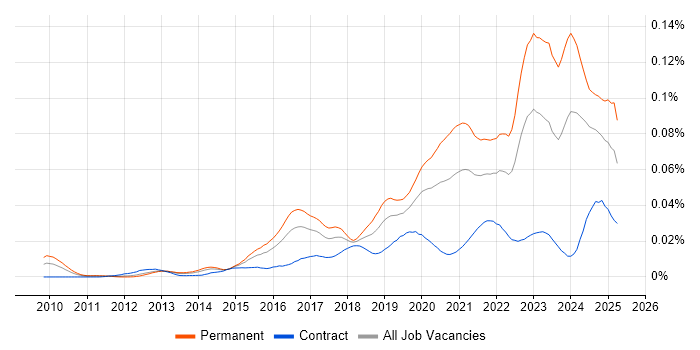Lead Cloud Engineer
UK
The median Lead Cloud Engineer salary in the UK is £107,500 per year, according to job vacancies posted during the 6 months leading to 15 May 2025.
The table below provides salary benchmarking and summary statistics, comparing them to the same period in the previous two years.
| 6 months to 15 May 2025 |
Same period 2024 | Same period 2023 | |
|---|---|---|---|
| Rank | 651 | 770 | 775 |
| Rank change year-on-year | +119 | +5 | +330 |
| Permanent jobs requiring a Lead Cloud Engineer | 54 | 127 | 202 |
| As % of all permanent jobs advertised in the UK | 0.098% | 0.13% | 0.20% |
| As % of the Job Titles category | 0.11% | 0.14% | 0.22% |
| Number of salaries quoted | 49 | 63 | 50 |
| 10th Percentile | £78,550 | £48,829 | £65,343 |
| 25th Percentile | £95,000 | £68,125 | £70,000 |
| Median annual salary (50th Percentile) | £107,500 | £89,000 | £80,000 |
| Median % change year-on-year | +20.79% | +11.25% | - |
| 75th Percentile | £115,000 | £110,000 | £87,500 |
| 90th Percentile | - | £115,000 | £92,625 |
| UK excluding London median annual salary | £95,000 | £70,000 | £72,000 |
| % change year-on-year | +35.71% | -2.78% | +2.41% |
All Permanent IT Job Vacancies
UK
For comparison with the information above, the following table provides summary statistics for all permanent IT job vacancies. Most job vacancies include a discernible job title that can be normalized. As such, the figures in the second row provide an indication of the number of permanent jobs in our overall sample.
| Permanent vacancies in the UK with a recognized job title | 49,982 | 93,747 | 91,844 |
| % of permanent jobs with a recognized job title | 90.62% | 94.66% | 91.53% |
| Number of salaries quoted | 26,989 | 67,111 | 57,934 |
| 10th Percentile | £29,750 | £28,500 | £32,500 |
| 25th Percentile | £41,250 | £38,500 | £45,000 |
| Median annual salary (50th Percentile) | £56,000 | £52,500 | £60,000 |
| Median % change year-on-year | +6.67% | -12.50% | - |
| 75th Percentile | £74,014 | £71,250 | £80,750 |
| 90th Percentile | £96,250 | £90,000 | £100,000 |
| UK excluding London median annual salary | £51,645 | £50,000 | £53,000 |
| % change year-on-year | +3.29% | -5.66% | +6.00% |
Lead Cloud Engineer
Job Vacancy Trend
Job postings that featured Lead Cloud Engineer in the job title as a proportion of all IT jobs advertised.

Lead Cloud Engineer
Salary Trend
3-month moving average salary quoted in jobs citing Lead Cloud Engineer.
Lead Cloud Engineer
Salary Histogram
Salary distribution for jobs citing Lead Cloud Engineer over the 6 months to 15 May 2025.
Lead Cloud Engineer
Top 11 Job Locations
The table below looks at the demand and provides a guide to the median salaries quoted in IT jobs citing Lead Cloud Engineer within the UK over the 6 months to 15 May 2025. The 'Rank Change' column provides an indication of the change in demand within each location based on the same 6 month period last year.
| Location | Rank Change on Same Period Last Year |
Matching Permanent IT Job Ads |
Median Salary Past 6 Months |
Median Salary % Change on Same Period Last Year |
Live Jobs |
|---|---|---|---|---|---|
| England | +137 | 47 | £110,000 | +12.24% | 8 |
| London | +101 | 32 | £110,000 | - | 7 |
| UK excluding London | +109 | 22 | £95,000 | +35.71% | 3 |
| South West | +125 | 11 | £95,000 | +22.58% | |
| Scotland | +60 | 7 | £95,000 | +26.67% | 1 |
| Work from Home | +109 | 3 | £110,000 | +37.50% | 3 |
| North of England | +47 | 3 | £69,750 | -0.36% | |
| South East | +93 | 1 | £110,000 | +86.44% | 2 |
| Yorkshire | +58 | 1 | £64,000 | -14.67% | |
| North West | -4 | 1 | - | - | |
| North East | - | 1 | £75,500 | - |
Lead Cloud Engineer Skill Set
Top 30 Co-occurring Skills and Capabilities
For the 6 months to 15 May 2025, Lead Cloud Engineer job roles required the following skills and capabilities in order of popularity. The figures indicate the absolute number co-occurrences and as a proportion of all permanent job ads featuring Lead Cloud Engineer in the job title.
|
|
Lead Cloud Engineer Skill Set
Co-occurring Skills and Capabilities by Category
The follow tables expand on the table above by listing co-occurrences grouped by category. The same employment type, locality and period is covered with up to 20 co-occurrences shown in each of the following categories:
|
|
|||||||||||||||||||||||||||||||||||||||||||||||||||||||||||||||||||||||||||||||||||||||||||||||||||||||||
|
|
|||||||||||||||||||||||||||||||||||||||||||||||||||||||||||||||||||||||||||||||||||||||||||||||||||||||||
|
|
|||||||||||||||||||||||||||||||||||||||||||||||||||||||||||||||||||||||||||||||||||||||||||||||||||||||||
|
|
|||||||||||||||||||||||||||||||||||||||||||||||||||||||||||||||||||||||||||||||||||||||||||||||||||||||||
|
|
|||||||||||||||||||||||||||||||||||||||||||||||||||||||||||||||||||||||||||||||||||||||||||||||||||||||||
|
|
|||||||||||||||||||||||||||||||||||||||||||||||||||||||||||||||||||||||||||||||||||||||||||||||||||||||||
|
|
|||||||||||||||||||||||||||||||||||||||||||||||||||||||||||||||||||||||||||||||||||||||||||||||||||||||||
|
|
|||||||||||||||||||||||||||||||||||||||||||||||||||||||||||||||||||||||||||||||||||||||||||||||||||||||||
|
||||||||||||||||||||||||||||||||||||||||||||||||||||||||||||||||||||||||||||||||||||||||||||||||||||||||||
